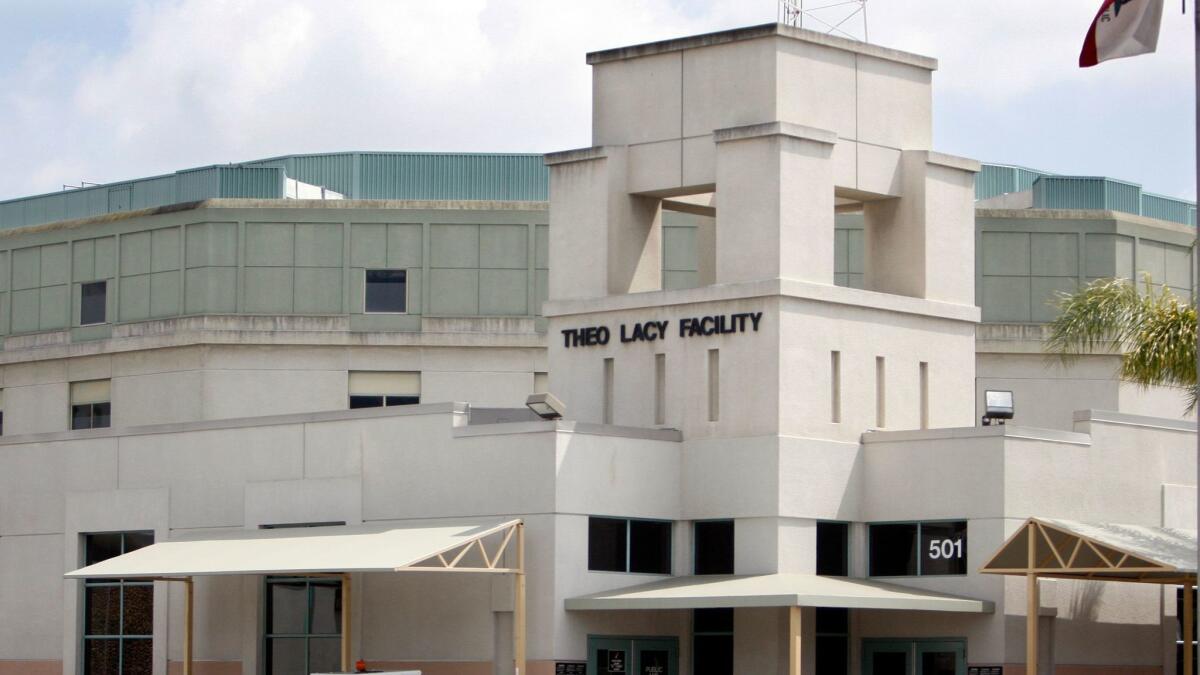Spoiled food and moldy showers: Poor conditions for immigrant detainees in O.C. jail, report says

The hundreds of immigrant detainees housed in Orange County’s largest detention facility have been served foul, slimy lunch meat; used moldy showers; and contended with inoperable phones, according to the findings of an internal inspection issued Wednesday.
Some detainees said they had to rinse their acrid lunch meat off with water before eating it, according to the report by the Department of Homeland Security’s Office of Inspector General.
The review, which was based on an unannounced inspection in October and interviews with detainees and staff members, found that the poor conditions violated standards set by U.S. Immigration and Customs Enforcement.
In addition to unsafe food handling, the inspectors found that high- and low-risk detainees were housed together and that the Orange County Sheriff’s Department’s method for imposing solitary confinement for discipline violated ICE standards.
After the inspector general’s review, ICE said in a statement Wednesday that staff “promptly remedied” issues related to bathroom cleanliness, food storage and detainee phone access.
In response to the inspector’s findings, the Sheriff’s Department referred to newly instituted practices at the facility, including a new lunch meat vendor and staff compliance meetings.
“The Sheriff’s Department remains committed to the health and safety of all immigration detainees,” Lt. Lane Lagaret, a spokesman for the department, said in a statement.
Since 2010, immigration detainees have been housed at two facilities run by the Sheriff’s Department: the Theo Lacy Facility in Orange and the James A. Musick facility in Irvine.
As of Wednesday, 528 detainees were housed at Theo Lacy, which has beds for up to 3,442 men, mostly jail inmates. The facility separates inmates from immigration detainees, most of whom are awaiting immigration court proceedings or deportation by ICE.
But the jail inmates and detainees eat the same food, underscoring the significance of the unsafe food practices.
According to the report, meat marked with a “keep frozen” label was stored in a refrigerator with no date showing how long it had been thawing. Lunch meat and ground beef were stored without coverings in large, walk-in fridges. The lunch meat was stored without wrapping, labels or information on its contents or expiration.
Five detainees interviewed as part of the inspection said they were “repeatedly served lunch meat that smelled and tasted bad, which they rinsed with water before eating.”
In the housing areas, inspectors found dirty showers with mold, trash and mildew. Detainees were given a scrub brush and all-purpose cleaner to wash the shower stalls themselves, but the report said such a practice is ineffective — all-purpose cleaners don’t eliminate mildew — and violates ICE standards, which require detainees to clean only their immediate living area.
Inspectors found high-risk detainees in the least restrictive barracks, while medium- to low-risk detainees were kept in more restrictive modules. The report said this housing practice violates ICE standards, which bar mingling of high- and low-risk detainees.
Sheriff’s Department officials were faulted for disciplining detainees by putting them in solitary cells with no access to visitors, recreation or group religious services. Those in solitary cells were kept there for up to 30 days, during which they could access one book and were released only briefly every other day for showers.
ICE standards call for those in disciplinary housing to receive visitors, enjoy recreation and have access to telephones and reading materials.
The inspector general also found that grievances by detainees were not being tracked to ensure sufficient follow-up. ICE said that in response, the agency worked with onsite leaders to improve methods for documenting detainee complaints, according to a statement.
ICE also said it valued its “longstanding relationship” with the Sheriff’s Department, according to the statement.
A spokesman for the Sheriff’s Department said the concerns raised by the inspection have been addressed and rectified. The Sheriff’s Department said that it was in the process of retaining a new lunch meat vendor and that lunches would be in prepackaged boxes with expiration dates, not prepared at the facility.
The jail facility instituted group meetings to discuss issues over compliance with standards and has a compliance officer onsite for the majority of the month for additional oversight. Two more inspections were scheduled for 2017.
Twitter: @MattHjourno
ALSO
Some Measure H supporters remain cautious as late ballots are tallied
CHP seeks charges against 106 people in state Capitol clash between neo-Nazis and protesters
Man killed, woman seriously injured in Long Beach shooting that may have resulted from road rage
UPDATES:
8:25 p.m.: This article was updated with a statement from U.S. Immigration and Customs Enforcement.
This article was originally published at 7:50 p.m.
More to Read
Sign up for Essential California
The most important California stories and recommendations in your inbox every morning.
You may occasionally receive promotional content from the Los Angeles Times.










